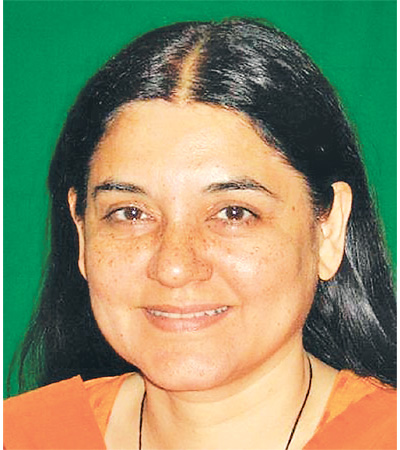Opinion
Veggies on the menu
A few months ago, a friend of mine said that his son wanted to study hotel management, but he was not going to allow him to do so since my friend didn’t want his son working with meat and eggs in any form. It was then that I remembered Mr Luniya and his crusade.
Maneka Sanjay Gandhi
A few months ago, a friend of mine said that his son wanted to study hotel management, but he was not going to allow him to do so since my friend didn’t want his son working with meat and eggs in any form. It was then that I remembered Mr Luniya and his crusade.
It just takes the determination of one person to change a system. I know—because in many a case I have been that one person. There is a saying attributed to Mahatma Gandhi, “First they ignore you, then they laugh at you, then they fight you, then you win.” And another by union leader Nicholas Klein in 1914, “And, my friends, in this story you have a history of this entire movement. First they ignore you. Then they ridicule you. And then they attack you and want to burn you. And then they build monuments to you.” So many things that are now taken for granted, whether red and green dots on food produced in India, no animals in circuses, banning the slaughter of camels, dissections in schools, and other educational disciples and hundreds of protection rules are just a few of the millions of changes.
I know hundreds of change-makers across India and it is a delight to work with them because they are knowledgeable, focused and brave.
It takes one person
Some years ago a Chartered Accountant, named Chandrashekhar Luniya, decided that it was impossible for vegetarians to join a hotel management course as they would compulsorily have to learn how to cut animals and cook meat dishes.
So he started writing letters to ministers and bureaucrats, and lobbying in his own community to make this into a major issue. He even came to Delhi and further pursued it. He brought in people to write.
He made a very persuasive case:
• There are religions that condone only vegetarian food. Why should a student learn what he was not going to do for the rest of his life? By making non vegetarian food education compulsory, many vegetarian children were deprived of the opportunity to learn hotel management, as it went against the wishes of their families and religions. (I know that I did not take biology when I was in school only because animal dissections were mandatory at that point)
• In the Hotel Management syllabus, there are more than 40 subjects—laws, front office, ticketing, accommodation, travel, accounting etc—of which culinary skills is just one subject. So, by not giving a choice in this one area, some students are deprived of learning that entire skillset.
• Not only is education across the globe becoming more flexible to allow for more and more disciplines and career choices, by straightjacketing this course, we don’t allow our rich vegetarian culture to spread across the globe.
• Since the students taking the courses are mostly non-vegetarian (since strict vegetarians wouldn’t touch meat), they would have less understanding and respect for the norms of vegetarians. The same dishes could be used, the same cooking utensils for cooking vegetarian and meat dishes—there could also be laxity in washing one’s hands. They would tend to skim over the details, in desserts for instance, and serve things with egg in them. Or fry vegetarian foods, like French fries, in non-veg oils.
• Vegetarianism is the fastest growing movement across the globe and there are sites which offer thousands of vegetarian hotels for travellers. There are many hotels, airlines and cruises that serve only vegetarian food. There are places of Pilgrimage where Non-Veg food is not allowed. These Vegetarian students can work in Hotels at those places, or can start their own restaurants or facility centres. Generally, in most Indian Hindu weddings, religious ceremonies and family programmes, the only food provided is vegetarian. We need better trained chefs in all these places.
• Students with very low marks are taken into these institutes, as potential applicants with much higher marks stay away due to this one reason. If the vegetarian option is created, there will be competition and more and more children with passion and intelligence will come to this industry and overall standards will go up. In fact, such institutions will start attracting students from other countries where this option of skipping meat cooking classes does not exist. Even the housewives can take up these degrees, and start catering from their homes.
• Our vegetarian food itself will evolve as more research is done on it.
• People are becoming more & more health conscious. Healthy vegetarian food is gaining acceptance. If there is more emphasis on vegetarian training, then
the next step is the demand for organic vegetables, and this will help farmers.
• Yoga, ayurveda, and other ancient medicines/practices are based on vegetarianism. With the availability of options for vegetarians, vegetarian food will become better and more people will turn vegetarian, becoming healthier in the process.
• Hospitality is the world’s largest business and service industry. But the business community, which is mainly vegetarian in India, stays away from it. If they were guaranteed excellent trained vegetarian cooks and staff, perhaps more investment would come in.
• Most middle and lower class restaurants (Dhabas, for instance) announce themselves as vegetarian or “both”. Since there is a lack of cooks trained professionally in just vegetarian food, the quality of food in these eateries depends on the luck of the draw, as people who come to work for cooks have learnt their trade at home. These veg restaurants will get quality manpower, which is in shortage now. Since 50 percent of the Indian population is vegetarian, totally or partially, why should they not feel at ease while travelling? (This is my favourite point. I travel a lot and I am always in search of Dhabas that are only vegetarian. These usually turn out to be very ordinary with a huge emphasis on paneer, which I don’t consider vegetarian at all.)
Change is here
Ultimately the Deputy Speaker of the Rajya Sabha, Prof PJ Kurien, wrote to the Indian Minister for Tourism on 5th April 2016 and the minister, Dr Mahesh Sharma, wrote back on 4th August saying that the Ministry would commence the option of vegetarian cooking as part of the BSc Degree programmes in the Central Institutes of Hotel Management directly under his Ministry. He said that they would start with the Management Institutes of Ahmedabad, Bhopal and Jaipur in 2016, establish a separate kitchen and bakery, additional staff and then extend it over the next year to all 18 institutes. In 2017, this option is now available in Six IHM’s: Gandhinagar, Bhopal, Jaipur, Chennai, Hajipur and Shillong. The admission process has started in December 2016, the JEE was held in April 2017 and now the counselling round is in progress.
This is a great new opportunity. Take advantage of it and apply now.
To join the animal welfare movement contact [email protected], www.peopleforanimalsindia.org




 9.89°C Kathmandu
9.89°C Kathmandu










